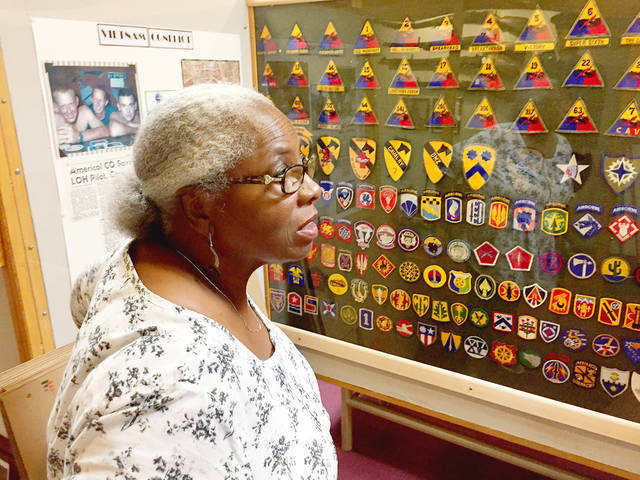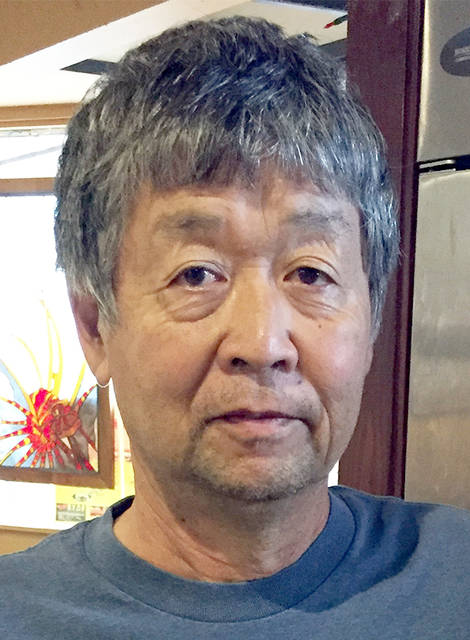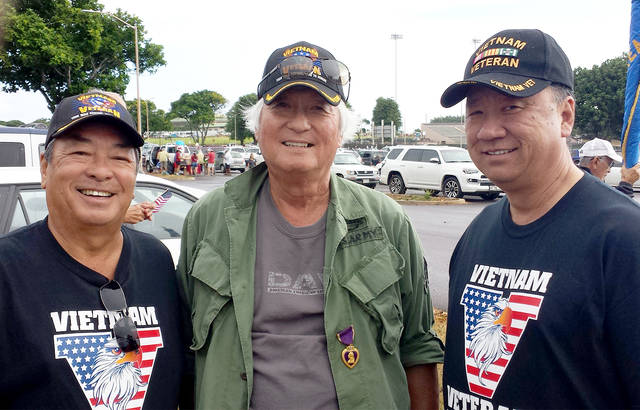LIHUE — Half a century after the peak of conflict in Southeast Asia, Vietnam veterans are being honored for their service.
The Kauai Veterans Council will be hosting the 50th anniversary commemoration of the Vietnam War for Kauai’s Vietnam-era veterans. The dinner is tonight at the Kauai Marriott Resort &Beach Club, and several hundred people are expected.
“It’s a day where we honor them, we show respect for the veterans that are home and those who have given their life for our country,” said Charlene Dorsey, who worked with the Southeast Treaty Organization illustrating maps and troop movements during the war from 1961 to 1964. “They don’t talk about what they went through, but they are proud.”
When veterans returned from the war, if they returned, they came home to anti-war protests.
“The worse thing was probably that the vets weren’t appreciated when they got home,” said Harry Shigekane, a Vietnam veteran recognized with 27 air medals for heroic acts, who was an Army aviator from 1969 to 1971. “We never announced the fact that we were veterans. They didn’t want anything to do with the war, they wanted to forget it ever happened. We lost a lot of people.”
Dr. Thatcher Magoun saw many casualties during the Vietnam War. He served as an Air Force surgeon from 1969 to 1972, and even operated on the commanding general.
When Magoun finished duty and was discharged in 1972, he came to Kauai.
“I don’t think I should be celebrated just because I’m a veteran,” Magoun said. “I just did my duty to the country. I was always happy to serve. That’s what a doctor does anyway, if you got people getting shot and blown up and all. That’s what I was trained to take care of.”
Vietnam veteran Myron Dobashi was commissioned as a second lieutenant in the Air Force and went on active duty in September 1965. He was assigned to Udorn Royal Thai Air Force Base in Northern Thailand as an air weapons controller-in-command, where he worked with fighters conducting air-to-air combat.
“We primarily worked in these dark rooms that had radar scopes, radios and the big board where you had the geographic area that people plotted aircraft movement and got involved with identifying enemy aircraft and intercepting them,” Dobashi said. “My job was to support the fighter bombers over North Vietnam. They would take off with minimum fuel and maximum bomb load. We would refuel the planes in mid-air and wait for them to come back after the bomb runs.”
When pilots didn’t check back, Dobashi was one of the first to know who was not coming home. They could be shot down by ground fire, surface-to-air missiles and in air combat, or run out of fuel.
“Contributing to saving a fighter pilot because of battle damage — when you’re able to hook them up safely and escort him home — was something you felt a great accomplishment,” he said. “You didn’t have much time, you had to act quickly. We made a significant contribution to bring them home safely.”
The ones who made it back returned home to a country of turmoil, with student protests and race riots. Many veterans were cussed out, yelled at and spit on, said Dobashi, but his mind remained quiet after the traumatic experience.
“War is war. It’s not something nice,” Shigekane said. “A lot of vets, they just want to forget. The difficult part of that is forgetting. It wasn’t a pleasant experience.”
Many veterans turned to alcohol and drugs to help them cope with what is now diagnosed as post-traumatic stress disorder.
“The Veterans Administration finally acknowledged the fact that a lot of people got messed up,” Shigekane said. “You had all these cases of PTSD, drug abuse, alcoholism and a large homeless problem.”
“I don’t think they’ve addressed the homeless problem so much,” he added. “They have acknowledged the fact that a lot of veterans have come down with a lot of chronic diseases, PTSD and stuff like that, a lot stemming from the use of Agent Orange. They’ve addressed that now, and they’re starting to take care of the people.”
Shigekane hopes veterans’ services can get the word out about programs available to those affected by wars.
“That was a very unpopular war,” said Shigekane, who also served in the National Guard for four years after the war. “Most of us went as individuals and came back as individuals. So for the returning vet, not too many people wanted to be known as veterans, and that has changed in the last 15 years or so.”
“They didn’t treat the veterans returning home from Vietnam very nicely,” said Army veteran Russell Maeda, who fought in combat during the war. “As far as coming home to Kauai, I didn’t feel that there was any animosity toward us. I guess in the islands, the ohana is much tighter here.”
Veterans’ Day is recognized as a federal holiday, but these veterans say they appreciate being thanked for the service any day of the year.
“It’s good to honor all veterans. I’m hoping the public sees it that way,” Maeda added. “The veterans served the country for our freedom. I’m just thankful for the support from the community. We’ve been getting a lot of donations from businesses and from the community, so we really appreciate that.”
One Kauai veteran will be celebrating a milestone birthday in December. Genevieve (Pruett) Anderson, who served in the Coast Guard during the conflict, turns 100 next month.
“Those who serve should be held in high regard and thanked for their service,” Dobashi said. “It’s hard to forget and put it aside. It’s good to finally get some official recognition and receive some kind of more formal thanks for serving. It’s hard for us to tell the story to those who have never been in combat.”





